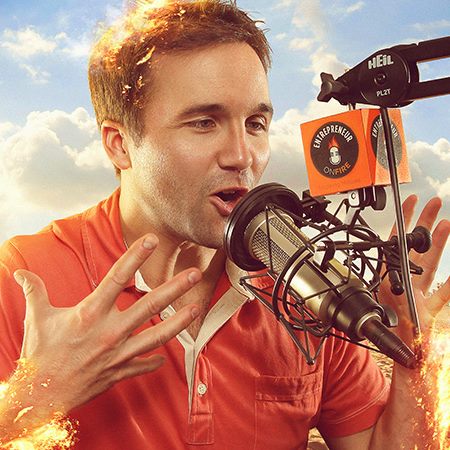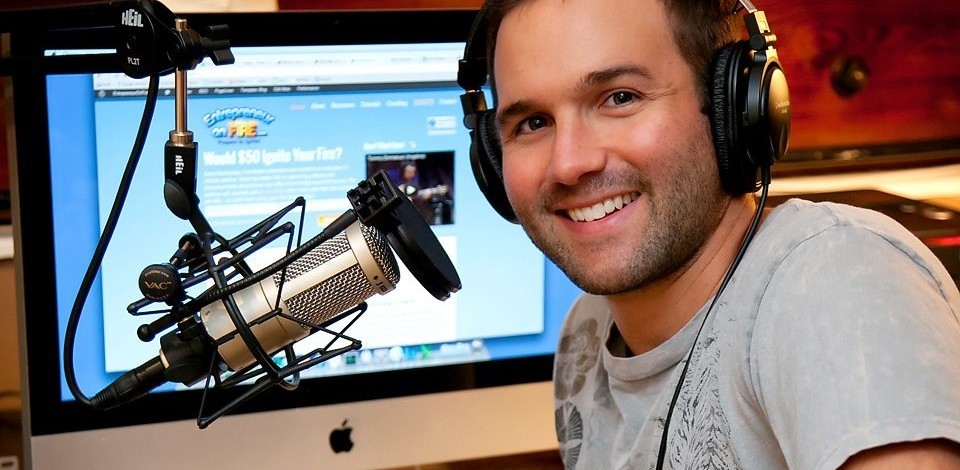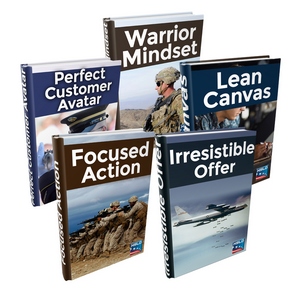 Today’s interview features a very special guest.
Today’s interview features a very special guest.
He is no other than one of the founders of High Speed Low Drag himself, John Lee Dumas.
John is the founder and host of Entrepreneur on Fire which was awardedThe Best of ITunes 2013.
John interviews today’s most successful and inspiring entrepreneurs seven days a week.
He has been featured in Forbes and Time Magazine.
He is responsible for turning Entrepreneur on Fire into a very profitable business.
In a short amount of time John has been able to build a multi-million business which makes him somewhat of an authority of this.
Moving forward John will be the one interviewing the guest on High Speed Low Drag but for now, the tables are turned as this series is kicked off.
Click here to listen to John Lee Dumas’ interview on iTunes
Click here to listen to John Lee Dumas’ interview on Stitcher
HSLD: Can you take a minute and tell us all about you personally?
John: I am just a country boy from Maine. I lived there until I was 18 until I went to college in Providence, Rhode Island on an ROTC scholarship. I graduated in 2002 which made me one of the first round of offices post 911 which was pretty intense.
About 14 months later I went on a 13-month tour duty in Iraq as an Armor Platoon Leader. I started out as a Second Lieutenant and was promoted as First Lieutenant after. In short I spent 2002 to 2010 as an army officer.
During my inactive years, I tried different tings such as law school, real estate and corporate finance.
I was chasing the wrong dreams but I did settle upon something that really lit my fire within and that was Entrepreneur on Fire. It was launched in September 2012 and was basically a 7-day a week podcast interviews of successful entrepreneurs.
We’ve done over 8 million downloads to date and are averaging northwards of 800,000 listens a month and growing. We’re generating over $200,000 a month in revenue in multiple income streams.
HSLD: Can you talk more about people that said to you that 7-days a week podcasts were impossible?
John: It’s interesting because the people who said that to me were the people that I should have been listening to. It was my mentor, Jamie Tardy who had been a very successful podcaster for many years when I hired her to help me with my podcasting journey.
Cliff Ravenscraft the podcast answer man also told me that seven days a week was not a good idea for a number of reasons including burnout.
To be fair both of these individuals helped me in countless ways to create Entrepreneur on Fire but in this one area I was adamant that I wanted to do what my intuition was telling me.673 episodes later I have not missed a day and I don’t foresee that happening until Episode 1000.
 HSLD: Let’s talk about your military experience. Did you have one pivotal moment?
HSLD: Let’s talk about your military experience. Did you have one pivotal moment?
John: There was a pivotal moment that actually came from my platoon sergeant. It’s actually a quote that I have been using in my life from that point forward.
As a second lieutenant because when we were under fire in Iraq, I tried to be Patton myself attempting to come up with a great idea to win the war. My platoon sergeant pulled me aside and said
“Lieutenant, a good plan now is better than a great plan later. Do something”.
I woke up the next morning thinking about that moment and realized that my first responsibility is to take action and protect these soldiers in my platoon.
From that day forward I was always focused on coming up with a good plan fast and immediately acting on it. I’ve taken that mentality and have just applied it to life especially to Entrepreneur on Fire.
If I had waited until I was a great podcast host and everything was ready for me to launch my podcast then I never would have launches and I never would have built what I have built today. If you want to be, do.
HSLD: What was leaving the military like for you? How did you transition?
John:
My transition was brutal and different compared to others’. I thought I had everything mapped out. My father is a lawyer so I immediately thought that law would be a great profession for me to move into. I applied to law school and got accepted for the fall of next year. Before that I knew I would spend the year traveling.
I went through the army transition program and found it sorely lacking for so many reasons. For example, the person who was telling me all about the civilian world and how to transition back actually had zero experience with it.
The resumes that I came across were unprofessional in that some were handwritten and others were made from old school typewriters. None of the jobs seemed appealing to me but I was confident that I had my own plan.
I spent the next year traveling the world and when I came back and thought that it was time for law school and my life to begin. The first day was actually the worst day that I could ever have imagined. I immediately knew that I hated it and I quit at the end of the first semester. I then had no idea what to do.
HSLD: Looking at all of that, what was the one clear lesson that you took away from your transition experience?
John: The number one lesson that I want to focus on was my lack of preparation. I should have been more prepared.
I should have looked at people out there in the civilian world who were veterans and non-veterans that were actually doing things that inspired me. I should have tried to find out how I could have learned from these people. I wish I turned it in that direction.
HSLD: What do you consider as your first civilian gig, one where you actually learned what its like to work in the civilian world?
John: Definitely with John Hancock. In 2008 I got a job in John Hancock in corporate finance.
I bought a condo in Boston and thought that this was it.
For 18 months I become really successful at it and made really good money.
I was doing really cool things and breaking all sorts of records because of the skills that I had developed from the military.
I was able to use a lot of discipline and focus. I did it for a year and a half and really enjoyed it on a lot of levels. I was promoted heavily and making a lot of money but then the economic crisis happened and all of a sudden our division shrank from 200 people to 70. I was one of the people who made the cut but that day our head said
“If you are not with us 100% then walk away because we are only going to work with people that want us”. I realized that I didn’t want to be there so I printed out my letter of resignation and walked out.
HSLD: That was a huge decision. Did you have an AHA moment which helped you make it?
John: I had an AHA moment in that moment in time but it wasn’t my overall AHA moment. My AHA moment then was:
I’ve seen what it looks like for men to lose their lives so I was never going to settle for less than what my authentic passion in life was. I was not going to settle for an average life. My experience in the military and seeing men in my platoon lose their lives gave me the courage to quit everything that I didn’t feel 100% passionate about- law school, John Hancock and corporate finance.
My actual AHA moment came four years later after trying out different jobs but still struggling because I wasn’t finding my thing. Luckily despite not finding my thing I was still feeding my head with all of the right things. I was reading books and listening to podcasts.
A consistent thing that was happening to me was that I was consistently running out of podcasts to listen to as I was driving to work because everybody was just doing a weekly show.
I kept asking myself where that 7-day podcast was that was interviewing successful entrepreneurs and sharing their journey because I need to hear these journeys so that I could have my own spark and my own AHA moment.
To follow Gandhi’s quote I started to be the change I wanted to see in the world and I realized I had to create a 7-day podcast. I called it Entrepreneur on Fire and that was the start of it. We’re still here almost 700 episodes later because I took that AHA moment I got stuck in traffic.
 HSLD: Let’s talk about your current business. What is it that really excites you about your business?
HSLD: Let’s talk about your current business. What is it that really excites you about your business?
John: Entrepreneur On Fire’s tagline is to inspire millions and EOF has now accumulated over 8 million downloads and growing more everyday.
We are listened to in over 145 countries and just last month we generated over 800,000 unique listens which is mind-boggling. We generate over $200,000 revenue a month and growing as we continue to add more revenue streams and grow our audience.
All of these things excite me in a major way but what really excites me is my flagship community Podcasters Paradise because this is now a 1200 person community of people who are looking to create grow and monetize their own podcasts, whatever that may be.
These people are becoming successful in their own niche and are lighting their own fires. That ripple effect that EOF and Podcaster Paradise is having on the world is what excites me.
HSLD: How did your experience in the military help you in your current role?
John: There are so many things that I pull out of my military experience specifically my time as an armor platoon leader.
The number one thing is realizing what works and then doubling down on it. There’s a certain way that your men are going to respond to you. There are certain strengths that will help your platoon grow.
When bullets start to fly in the civilian world you want to be doubling down. You want to be optimizing what actually works while doing what you can to minimize your weaknesses.
That’s what I’ve always learned and I have been able to focus on what works for EOF and cut out all of the noise.
John’s Lighting Round Answers:
- What was the most difficult adjustment you had to make when you transitioned into the civilian world? People taking things seriously. When you’re an officer people take you seriously because they know you’re going to execute. What I saw in corporate finance and commercial real estate I always felt like I couldn’t just say something and know that it was going to be taken care of. I had to reserve extra bandwidth to double-check and follow up and it was just so annoying.
- What business advice would you pass along to those making the transition now? Don’t be afraid to be an apprentice. If you are able to go with somebody in your niche that is successful and say “How can I be a value to you? I want to give you value so that I can learn and absorb your success?”
- What is one of your habits that contribute to your current success? Waking up early every morning. My alarm goes off at 5:20 every morning and as soon as it does I’m up, I’m exercising, I’m getting fluids in my body, I am eating right and I am seizing the day.
- What is the biggest generalization that you had to overcome in the civilian world? A lot of people thought that because I had come from the army that I had no sense of humor and no personality.
- What book would you recommend to our listeners? “The Slight Edge” by Jeff Olsen. Also, “The Compound Effect”.
- What if you woke up tomorrow and it was the first day that you transitioned and you still have all of the knowledge and experience that you have, what would you do in the next seven days? I would get on Google and immediately google if there was a conference somewhere in the world in your niche or industry that I could go to. Then I would buy myself a ticket and go to that conference with just the desire to network. I would network with different people, go to talks to ask questions and engage with the speakers, go to the network parties and just engage with everyone.
Click here to listen to John Lee Dumas’ interview on iTunes
Click here to listen to John Lee Dumas’ interview on Stitcher
